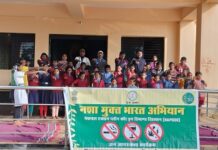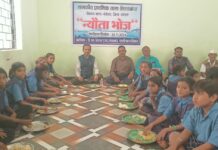Hasina and Rashidul Islam’s third child came into the world at lunchtime Wednesday. Blood from his birth ran from the floor of the tarpaulin-sheet shelter, over sodden yellow clay, into a ditch running along the road. No chicken was slaughtered to celebrate the birth of a son: the family had just ended a 15-day journey to safety, fleeing the hamlet of Toarbil in Myanmar’s Rakhine state. “I don’t know what the future holds for us,” Rashidul Islam said, “I can’t even afford to bury my son if he dies.”
In Bangladesh, now home to a tide of refugees that United Nations estimates put at 500,000, and unofficial ones place up to 200,000 higher, officials fear that failure to address the needs of desperately poor families could see this catastrophe degenerate into a region-wide security crisis. Long-term hardship, officials are warning, can spark communal destabilization inside Bangladesh, and set off security challenges.
Nurul Avsar, also known as Ruhullah, one of the key leaders of Harkah al-Yaqin, the jihadist group which sparked off the war in Rakhine, was himself a refugee, graduating from organised crime to terrorism, local authorities say. Bangladesh officials privately say they want to see India push Myanmar to agree to a safe-zone proposal, which should allow the Rohingya to return to the country. The safe-zone idea, alluded to by Prime Minister Sheikh Hasina, envisages UN-supervised areas in which the Rohingya can live, while larger political issues are addressed.
India has so far sent a 100-tonne consignment of emergency aid to the refugees, but Bangladesh hopes the gesture will be followed by action. “India has always stood by Bangladesh at times of crisis,” says Road Transport Minister and Awami League general secretary Obaidul Quader. “Now, we need India to stand by us again.”
The stench of excrement, sweat and desperation hang over Bahukhali camp and its neighbour, Kutupalong. Sprawled over more than 2,000 acres of forest newly made available to refugees, the camps have already begun to overflow. Though experts have applauded the Bangladesh government’s efforts, its resources and those of NGOs have been overwhelmed by sheer numbers. There is desperate shortage of sanitation.
Husna Begum, who ended a two-week journey from the Rakhine coast to Hariyakhali, near Shah Porir Dwip on Wednesday, paid over 300,000 kyat, or almost Rs 15,000, to bring herself and her two children to safety. Her husband, she says, was shot dead as she attempted to flee a Myanmar army attack on their village, Nang Song.
Finding herself physically too weak to fight among the desperate crowds who throng relief trucks, Husna Begum and her to infants survive on begging by the roadside. Bar small cash handouts, there isn’t much: well-meaning charities have brought so many clothes that the roads are strewn with a carpet of discards, but fresh water and construction material is desperately short.
“I managed to get a tarpaulin three days ago,” Husna Begum says, “but I am very afraid someone will snatch it away.” She is also scared, with reason, of assault: violence flares often amid the desperation, and single women are easy targets.
Muhammad Zubair, a volunteer with the Islamic religious charity Markaz-ul-Islami, says there are just not enough people on ground to cater to the needs of the refugees. “To build homes for 400,000-500,000 people, do you have any idea how difficult that is. This is a test of the world’s compassion.”
Bangladesh authorities, for their part, have viewed the influx of religious charities with a wary eye. Following the 2012 violence, the Lashkar-e-Taiba-linked Falah-i-Insaniyat Foundation is known to have operated in the region, providing a channel to route funds to the Rohingya Solidarity Organisation, one of the precursors of Harkah al-Yaqin.
Failure to find solutions, officials say, is certain to legitimise communal politics within the region — no small threat. Earlier this summer, over 200 homes belonging to ethnic Chakma tribals, Buddhist by faith, were set on fire by plains settlers attempting to seize the lands. In 2012, the last major refugee complex led local Islamist politicians to attack, and raze, a Buddhist temple in the Cox’s Bazar area.
Bangladesh signed a peace accord with Chakma insurgents in 1997, but security officials fear the conflict could be reignited should tensions continue to simmer in the Cox’s Bazar camp. Local authorities have deployed additional police through the area.
Trying to contain the risk of conflict, the government has been seeking to contain refugees to camps. The élite Rapid Action Battalion was pushed into service Thursday, evicting more than 200 refugee families from a plot near the controversial Imam Muslim Islamic Centre in Cox’s Bazar; loudspeakers announcements have been made asking Rohingya not to leave registered camps. The Bangladesh army has also been deployed to help in relief work.
In practice, the enterprise has been as successful as herding cats. Harried police officials asking refugees to report for issue of biometric identity cards were simply being ignored Thursday evening.
Large numbers of Rohingya refugees are also living with kin, scattered across the entire Cox’s Bazar belt . “There are hundreds of people living on our village,” says Phular Del resident Hamid Bahadur, “and even more in the older, registered refugee camps in the area. No one has the heart to deny someone in this situation a home.”
“There is no hard evidence on the presence of terrorists from Myanmar among the refugees,” says Afroz-ul-Islam Tutul, the Superintendent of Police in charge of the refugee population in Cox’s Bazar. “But we are very aware of the dangers in this situation, and determined.”
Private hospitals in Cox’s Bazar have treated people with gunshot wounds — some elderly, some children, but several young men who make no secret of having participated in battles.
From its experience of past Rohingya refugee waves — estimated at 200,000 in 1978, another 200,000 in 1998-1999, and some 10,000 each year in between — Bangladesh knows addressing the needs of this influx will be hard to meet. Few Rohingya have an education, because of poor infrastructure in the Rakhine state; many eke out a living as rickshaw drivers or construction labourers, often volunteering to work at wages lower than local residents.
Endemic poverty has also made the Rohingya refugees vulnerable to crime. In 2015, a trial of human traffickers in Thailand threw up evidence over 500, who had paid touts to work illegally, had been left to die in jungle camps, mainly the elderly and those too weak to do hard labour.
Lieutenant General Manas Kongpaen, a senior Thai military officer, was among those convicted of trafficking Rohingya from Bangladesh. Though the traffickers have since been driven underground, the practical impact has been to boost prices for illegal passports, police say.
Bangladesh police say young Rohingya have also been extensively used by Bangladesh-based criminal cartels to smuggle Yaba, a cocktail of methamphetamine and caffeine popular among drug-users throughout south-east Asia. “How are we going to educate these tens of thousands of kids, if we don’t want them ending up at religious seminaries,” one Bangladesh official asked. “How do we meet the needs of women and orphans? How do we create employment? It is just not possible for Bangladesh to do this alone.”
“In our view, countries like India have to step up now, because they will suffer the consequences of failure, not only us.”















